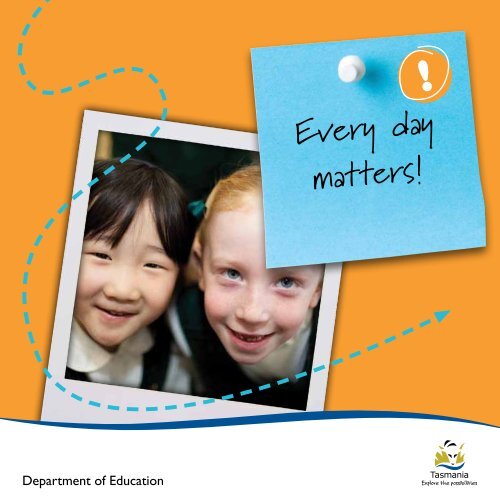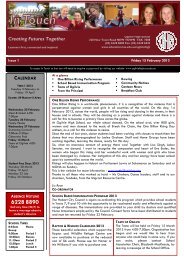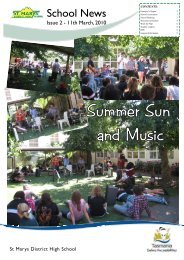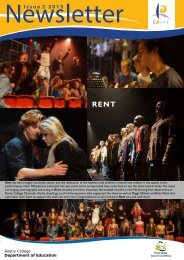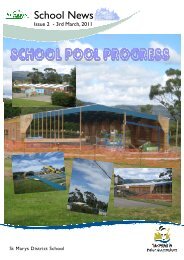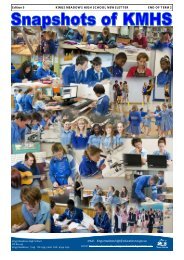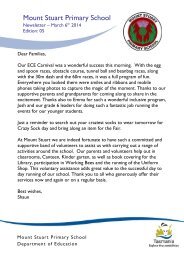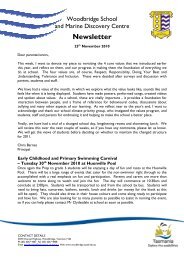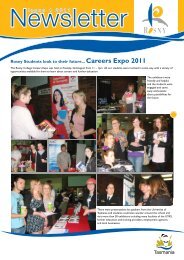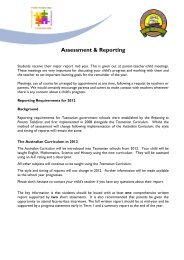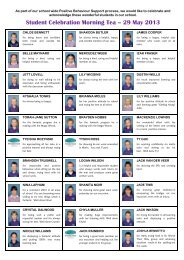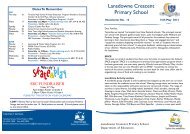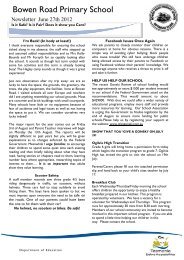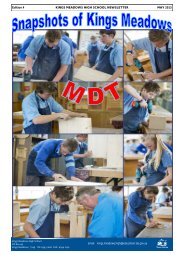Every day matters! - Department of Education Schools Websites
Every day matters! - Department of Education Schools Websites
Every day matters! - Department of Education Schools Websites
You also want an ePaper? Increase the reach of your titles
YUMPU automatically turns print PDFs into web optimized ePapers that Google loves.
<strong>Every</strong> <strong>day</strong><br />
<strong>matters</strong>!<br />
!<br />
<strong>Department</strong> <strong>of</strong> <strong>Education</strong>
<strong>Every</strong> <strong>day</strong> <strong>matters</strong>!<br />
Starting school is an exciting and important time for both you and<br />
your child.<br />
The first few years at school – from Kindergarten to Grade 1 – are<br />
essential for future learning, and help your child to develop and build on<br />
the foundations you have started at home.<br />
Research shows that the early years are vital in making sure children get<br />
the very best start to life.<br />
In Tasmania, there are a number <strong>of</strong> early years programs to help to<br />
make the transition from home to early childhood settings and school<br />
much easier.<br />
<strong>Every</strong> <strong>day</strong> <strong>matters</strong>! is written for parents <strong>of</strong> young children starting<br />
school. It includes tips to help your child settle into school life, as well<br />
as information about what a “typical <strong>day</strong>” might be for your child in<br />
Kindergarten, Prep and Grade 1.<br />
<strong>Every</strong> <strong>day</strong> <strong>matters</strong> and every <strong>day</strong> at school helps your child become a<br />
happy and confident learner.<br />
Hopefully this booklet will be helpful as your child starts school.
Your child’s school journey<br />
You are an essential part <strong>of</strong> your child’s learning and development through school.<br />
The encouragement and support you give as parents in the early years <strong>of</strong> your child’s education really makes a difference<br />
and helps your child to be positive and confident about school.<br />
Your child’s journey through school builds on all the things they have learned with you at home – just as Prep builds on the<br />
learning from Kindergarten, and Grade 1 builds on the learning from Prep.<br />
Kindergarten is an important step in supporting the learning and development <strong>of</strong> your child, and most children start school<br />
by attending the local Kindergarten when they are four.<br />
Make sure that you talk <strong>of</strong>ten with your child’s teacher and find out what you can do at home to support your child’s<br />
learning in class. Your enthusiasm will help your child to be excited about going to school and to be proud <strong>of</strong> the things that<br />
they are learning.<br />
<strong>Schools</strong> also <strong>of</strong>fer playgroups or programs for children from birth to age 4, so they can become familiar and comfortable<br />
with school before being formally enrolled in Kindergarten. Check with your local school to see what programs may be<br />
available for you and your child.<br />
EVERY DAY MATTERS 1
KINDERGARTEN<br />
<strong>Every</strong> <strong>day</strong> <strong>matters</strong><br />
Going to Kindergarten, Prep and Grade 1 each <strong>day</strong> gives<br />
children the best start to be successful learners at school.<br />
If your child attends school regularly in the early years, they<br />
are more likely to continue attending regularly in the future<br />
and are less likely to experience gaps in their learning.<br />
At school, teachers plan programs in a sequence so children<br />
learn how to read, write and understand maths. Children<br />
also learn how to share and get on with other children.<br />
When children do not go to school regularly, they miss<br />
out on important ideas and skills that might mean they<br />
experience difficulties later.<br />
!<br />
Taking an interest in what<br />
your child does at school,<br />
helping in class and being part<br />
<strong>of</strong> the school community shows<br />
your child how much you value<br />
schooling.<br />
You can help make every <strong>day</strong> matter at school by:<br />
• talking with the teacher if you have trouble getting your<br />
child to school.<br />
• talking positively about school so your child is happy and<br />
confident about attending.<br />
• showing an interest in what your child is doing at<br />
school and talking with the teacher about what you<br />
can do at home.<br />
• arranging play times with other children outside <strong>of</strong> school<br />
to help your child make friends.<br />
• teaching your child how to share and take turns<br />
• arriving and collecting your child on time.<br />
• making sure your child gets enough sleep each night so<br />
they are not tired in the morning.<br />
• making appointments after school with the doctor, dentist<br />
or specialist and not during school time.<br />
• taking family holi<strong>day</strong>s during the school holi<strong>day</strong>s and not<br />
during term time.<br />
If your child is unwell and unable to go to school, make sure<br />
that you telephone or text the school to let them know.<br />
Talk with the teacher to find out how you can help your<br />
child catch up on any work they have missed.<br />
<strong>Every</strong> <strong>day</strong> <strong>matters</strong> and every lesson counts!<br />
2 EVERY DAY MATTERS
KINDERGARTEN<br />
Starting Kindergarten –<br />
the beginning <strong>of</strong> the journey!<br />
Although Kindergarten is not compulsory, children learn<br />
important maths, reading and writing skills as well as social<br />
skills that will help them throughout school.<br />
Going to Kindergarten encourages a love <strong>of</strong> learning<br />
and helps children become confident learners.<br />
Being confident and happy about your child starting<br />
Kindergarten helps make the transition from home to<br />
school easier for both you and your child.<br />
EVERY DAY MATTERS 3
KINDERGARTEN<br />
What happens during the <strong>day</strong><br />
Your child will go to Kindergarten for either<br />
10 hours or 15 hours each week, depending<br />
on your local school.<br />
By 2013, all Kindergarten programs will be 15<br />
hours each week. The increase in Kindergarten<br />
hours will mean that children have more time to<br />
learn and develop socially and emotionally, and it<br />
may also make it easier for them when they begin<br />
full-time school.<br />
Talk with your child’s school to find out how the<br />
Kindergarten program is set up. Sessions may be full<br />
<strong>day</strong> or half <strong>day</strong>, or a combination <strong>of</strong> both.<br />
Whatever your child’s Kindergarten timetable might<br />
be, the teacher will have regular breaks planned each<br />
<strong>day</strong> for snacks, play time and rest.<br />
Some schools ask parents to contribute fruit and<br />
snacks which are shared with all children for morning<br />
or afternoon recess. If your child is in a full <strong>day</strong><br />
Kindergarten, you will need to also pack a healthy lunch.<br />
Kindergartens encourage parent help. This is a great way to<br />
form a good relationship with your child’s teacher, as well as<br />
see your child’s development in the classroom.<br />
At the end <strong>of</strong> the <strong>day</strong>, you need to<br />
collect your child from the classroom.<br />
If you need someone else to pick up your<br />
child, such as grandma or a carer, you<br />
need to let the school know in advance<br />
so the teacher knows who is collecting<br />
each student. The teacher waits for<br />
someone approved to collect each child<br />
so it is important to make sure you<br />
always have someone organised.<br />
In Tasmanian Government schools, all children are<br />
encouraged to wear school uniform from the time they<br />
start Kindergarten. Wearing the uniform helps children<br />
feel they belong to the school family and means they can<br />
be identified at all times, such as in the playground or on<br />
excursions. Most schools have a uniform shop or clothing<br />
pool that has new and second hand uniforms. Ask your<br />
school about your options.<br />
4 EVERY DAY MATTERS
KINDERGARTEN<br />
What does my child learn<br />
Kindergarten is a wonderful time where children learn<br />
through play activities planned by the teacher, painting,<br />
drawing and other creative activities, talking and listening,<br />
hands on exploration and making new friends.<br />
At Kindergarten, your child will build on what they have<br />
learned at home. This will include:<br />
• language and how language is made up <strong>of</strong> words<br />
• how written words are made up <strong>of</strong> letters in the alphabet<br />
• how spoken sounds can be written down<br />
• numbers and shapes and the many different ways we use<br />
maths in our lives every <strong>day</strong>.<br />
These early lessons will help your child later with reading,<br />
spelling, language and maths skills, as well as developing<br />
social skills by playing with other children and sharing<br />
equipment. Play helps your child to share and take turns<br />
while developing coordination and confidence.<br />
Your child’s teacher takes into account the many different<br />
experiences and backgrounds children bring to the classroom<br />
and makes sure the learning program helps each child.<br />
EVERY DAY MATTERS 5
KINDERGARTEN<br />
Literacy<br />
In Kindergarten your child will…<br />
• develop skills by having books read to them, sharing<br />
stories, learning songs and rhymes and experimenting<br />
with shapes, colours and textures.<br />
• start to learn how to identify words, syllables and rhymes<br />
to help with reading and writing in the future.<br />
• learn to describe objects, tell stories and recognise<br />
print such as their written name. Talking about what<br />
they are planning, doing and thinking is a big part <strong>of</strong> the<br />
Kindergarten <strong>day</strong>.<br />
• learn that writing is different from drawing and that talk<br />
can be written down.<br />
• learn that writers write from left to right and from top<br />
to bottom.<br />
Children may also begin to experiment with letters <strong>of</strong> the<br />
alphabet using things such as sand and play dough, as well<br />
as crayons and paints.<br />
Through storybooks, your child learns that stories have<br />
characters and events. The teacher may ask children to<br />
talk about how the characters are similar or different from<br />
people in their lives.<br />
At this age, your child may not understand that there is a<br />
connection between letters and sounds.<br />
Their writing may show randomly placed letters or<br />
scribbles that look similar in form to a letter.<br />
They may focus on the first letter <strong>of</strong> a word as they learn<br />
about letter–sound connections. Later they may also<br />
recognise the last letter, for example they may recognise the<br />
word mummy by the first letter, or by the first and last letters.<br />
At home<br />
Children at this stage take an interest in books and the<br />
words or writing they see in them.<br />
Tell stories, say or sing nursery rhymes, poems and songs.<br />
Make up actions together.<br />
Children at this age <strong>of</strong>ten ‘read’ by using pictures or their<br />
memory <strong>of</strong> the story. They may identify some words<br />
but are <strong>of</strong>ten more focused on the meaning rather than<br />
reading every word. Encourage your child to ‘have a<br />
go’ and let them pretend to read their favourite book.<br />
Children pretend to read in the early stages by making up<br />
the story. This is a great start.<br />
Read your child’s favourite book over and over. Encourage<br />
them to join in. Get them to tell you the story using the<br />
pictures for prompts or let them pretend to read and make<br />
up the story. Talk about the end <strong>of</strong> the story and encourage<br />
your child to express their opinion. Did they like the<br />
ending How else could the story have ended<br />
Encourage your child to also ‘have a go’ at writing words<br />
using one, two or three letters. They can tell you the<br />
reason for writing and why – for example, “I am writing a<br />
letter to Granny to say thank you for my birth<strong>day</strong> card.”<br />
6 EVERY DAY MATTERS
KINDERGARTEN<br />
At home<br />
Children hear and see how numbers are used in their<br />
home through every<strong>day</strong> experiences and begin to match<br />
number names to small groups <strong>of</strong> objects – for example,<br />
“We need four plates, so if I get two plates and then get<br />
two more, we’ll have four plates.”<br />
Maths<br />
In Kindergarten your child will…<br />
• learn to match and compare small groups <strong>of</strong> things to say<br />
which has more or less, and begin to link number names<br />
to their quantities.<br />
• start to notice the difference between numbers and<br />
letters and begin to read them. They will also learn about<br />
shapes, size, position and order.<br />
Activities might include making models and patterns,<br />
sorting and rearranging small collections, and comparing<br />
the size <strong>of</strong> things.<br />
Children also play games that help them read and say<br />
numbers, and do puzzles to develop problem solving skills.<br />
A great way to practise maths skills at home is by cooking<br />
together. Have your child fill cups <strong>of</strong> flour or tablespoons<br />
<strong>of</strong> water while you count out loud how many are needed.<br />
Children at this age learn about measurement by hearing<br />
every<strong>day</strong> words like full and empty, big and small, tall and<br />
short, and heavy and light.<br />
When tidying the bedroom, shopping or when you are<br />
out and about, talk to your child about positions such as<br />
in and on and under. Also chat about whether something<br />
is the same, near, far or upside down.<br />
Number songs and number rhymes are important in<br />
helping your child learn about counting. Spend time<br />
together singing songs like One, two, three, four, five,<br />
once I caught a fish alive and One, two, buckle my shoe.<br />
Number books that you read together and talk about are<br />
also a great way to learn.<br />
EVERY DAY MATTERS 7
PREP<br />
Starting Prep – its compulsory!<br />
School starting ages are set by law. In Tasmania the compulsory school starting age is<br />
five years. This means that a child who is at least five years old as at January 1 in any<br />
year must be enrolled in full-time Prep.<br />
If you feel your child is not ready for school, this should be discussed with your<br />
school’s principal.<br />
Prep is five full <strong>day</strong>s each week. This may feel quite unusual if you are used to having<br />
your child home with you during the week, and it may take you and your child some<br />
time to get used to.<br />
8 EVERY DAY MATTERS
PREP<br />
What happens during the <strong>day</strong><br />
Your child’s Prep classroom may be set up much like the<br />
Kindergarten classroom.<br />
As with Kindergarten, schools encourage parents to<br />
participate in parent help programs. By visiting the<br />
classroom, you will find out what your child is doing at<br />
school and be able to support their learning at home, e.g.<br />
visit your local library and borrow books about what they<br />
are learning at school.<br />
Pack a healthy lunch, snack for recess and drink (water is<br />
best) for your child each <strong>day</strong>.<br />
<strong>Schools</strong> <strong>of</strong>ten have a set <strong>day</strong> for programs such as PE, music<br />
and library.<br />
Make time to read the library or other favourite books with<br />
your child at home. This not only promotes good reading<br />
habits, it’s also a great way to spend time together.<br />
What does my child learn<br />
Prep builds on all the things your child learnt at<br />
Kindergarten. The skills and ideas your child learns are really<br />
important for the future. Literacy, numeracy and social and<br />
emotional development are the focus <strong>of</strong> Prep programs.<br />
In Prep, learning is more structured than in Kindergarten, but<br />
learning through play is still very important. Hands-on learning<br />
is still essential for students to develop appropriate skills.<br />
EVERY DAY MATTERS 9
PREP<br />
Literacy<br />
In Prep, your child will learn about:<br />
Phonics: Phonics are sound–letter relationships used<br />
for reading and writing. Children are taught about the<br />
difference between letter names (such as A, B, C, D) and<br />
their sounds.<br />
They are also taught that the letter name remains the<br />
same but the sounds may change depending on the letters<br />
around them. For example:<br />
Cake – c/ae/k/e<br />
Call – c/aw/ll<br />
Phonological awareness: Phonological awareness is about<br />
understanding words, syllables and rhymes in sentences.<br />
For example:<br />
The word ‘monkey’ is made up <strong>of</strong> two syllables – mon-key.<br />
The words cat, hat and mat all rhyme.<br />
Phonemic awareness: This is about knowing that the word<br />
‘cat’ is made up <strong>of</strong> three sounds – c / a / t. If the middle<br />
sound is replaced by / u / the word becomes ‘cut’, and that<br />
‘cat’ starts with the same sound as ‘car’.<br />
High frequency words: These are <strong>of</strong>ten referred to as<br />
‘sight words’ and include ‘a’, ‘I’, ‘the’, ‘and’, ‘is’, ‘to’, ‘was’ and<br />
‘saw’. These are words children learn to recognise and<br />
understand automatically when reading.<br />
At home<br />
Your child starts to become a more confident reader.<br />
They may now read slowly and deliberately, paying<br />
attention to what is on the page. They may tell you about<br />
the things they have read. Encourage your child to talk<br />
about what happens in a story.<br />
Point out words in a book such as ‘and’, ‘the’ and ‘when’<br />
and see how many times familiar words come up.<br />
Use items such as shopping lists, receipts, recipes,<br />
newspapers and television guides to show your child how<br />
reading is useful in <strong>day</strong> to <strong>day</strong> life.<br />
Share a variety <strong>of</strong> books with your child at home, and<br />
discuss the story with them. Ask them to make predictions<br />
about the book based on the cover. Ask them what they<br />
would like to find out. At the end <strong>of</strong> the story ask them<br />
what they learnt about the topic, characters, or events.<br />
If you have the Internet at home, spend time exploring<br />
children’s websites with your child. These <strong>of</strong>ten promote<br />
reading and problem solving.<br />
Prep students write short stories about their experiences,<br />
and begin to show some evidence <strong>of</strong> sound-letter<br />
knowledge. Practise writing with your child, for example,<br />
write shopping lists and invitations together.<br />
10 EVERY DAY MATTERS
PREP<br />
At home<br />
At home, practise using numbers and counting with<br />
your child.<br />
When setting the table, ask your child, “We have two<br />
visitors coming. There are four people in our family so how<br />
many plates will we need”<br />
Maths<br />
Prep is when your child learns to:<br />
• say number names in order beyond 10 and starts to<br />
notice patterns in numbers, for example 21, 22, 23, or<br />
31, 32, 33.<br />
• solve every<strong>day</strong> problems involving adding, removing, handing<br />
out and sharing very small numbers <strong>of</strong> objects. For example,<br />
they may use toy farm animals to show three cows were<br />
put in a paddock with four cows and to work out how<br />
many cows there are all together.<br />
• count and talk about how much, how many and how<br />
long and use very small numbers to ‘get enough’ items for<br />
their games and activities.<br />
• compare the size <strong>of</strong> things using language like longer,<br />
shorter, taller, heavier, lighter, fatter and thinner.<br />
• talk about shape words (for example round, circle, square<br />
and triangle) and position words (for example near, far,<br />
between, under and behind).<br />
Encourage your child to use their new number skills to<br />
say how many objects there are when there is no need to<br />
count, for example you can just ‘see’ three things,<br />
or even six things as three things and three things.<br />
Measurement is also an important part <strong>of</strong> learning about<br />
maths and numbers. Chat with your child when you are<br />
cooking, shopping or at bath time about how different<br />
things might be longer or shorter, thicker or thinner,<br />
lighter or heavier.<br />
Help your child pour water or sand from one container<br />
to another to decide which holds more, or investigate<br />
whether a tablecloth is big enough to cover the table.<br />
These easy activities help children understand and relate<br />
to numbers, counting and measurement.<br />
EVERY DAY MATTERS 11
GRADE 1<br />
Grade 1 – it’s compulsory too!<br />
Grade 1 is a time <strong>of</strong> rich learning experiences where your child will build on everything they<br />
learnt at home, Kindergarten and Prep.<br />
It is important to make sure your child attends each <strong>day</strong> <strong>of</strong> school, because, not only does<br />
every <strong>day</strong> matter – every lesson counts!<br />
If your child is unable to attend school because they are unwell, ask the teacher what you can<br />
do at home to help them keep up.<br />
12 EVERY DAY MATTERS
GRADE 1<br />
What happens during the <strong>day</strong><br />
Classes in Grade 1 are more structured than Kindergarten<br />
and Prep. Students will still have lots <strong>of</strong> hands-on learning and<br />
opportunities to express themselves in different ways, but the<br />
basics <strong>of</strong> literacy and numeracy will be their main focus.<br />
Some schools have split or combined classes – where<br />
classes are combined to include Prep and Grade 1 children<br />
or Grade 1 and 2 children. These classes allow children <strong>of</strong><br />
varying ages and abilities to learn together.<br />
What does my child learn<br />
In Grade 1, teachers make sure there is a progression <strong>of</strong><br />
learning from one lesson to the next in a number <strong>of</strong> subjects.<br />
Attending school every <strong>day</strong> ensures your child does not<br />
miss out on vital subject content. This is why it is important<br />
for your child to attend school every <strong>day</strong>.<br />
Your child will continue to build on their reading, writing,<br />
maths and social skills.<br />
!<br />
Helpful hint - Attending parent<br />
information sessions is a great way to<br />
meet other parents and ask questions<br />
or raise concerns. If you cannot attend<br />
the parent information session, call your<br />
school or talk with the teacher to<br />
make another time to meet.<br />
EVERY DAY MATTERS 13
GRADE 1<br />
Literacy<br />
At school students listen to and respond to a range <strong>of</strong><br />
books and electronic texts.<br />
The number <strong>of</strong> words they know will increase and they will<br />
start to use extended sentences. They read simple picture<br />
books and information books, retell stories and discuss the<br />
content, plot, characters and setting. They write imaginative<br />
and informative texts. They accurately spell a growing<br />
number <strong>of</strong> words and begin to edit their work.<br />
At home<br />
Read to your child every <strong>day</strong> and let them have a turn<br />
reading to you, particularly if they have a home reader.<br />
Discuss favourite parts, the plot, characters and setting.<br />
Encourage your child to write at home by providing pens,<br />
pencils and paper and encourage them to read lots <strong>of</strong><br />
books by visiting your local library and getting your child<br />
a library card.<br />
Make sure that you praise your child for reading and<br />
writing at home so that they start to see learning as a<br />
positive experience.<br />
14 EVERY DAY MATTERS
GRADE 1<br />
At home<br />
Help your child learn about position (where something<br />
is), distance (how far away) and direction (which way<br />
something is pointing or facing) by talking about these<br />
ideas and giving simple directions.<br />
Maths<br />
In Grade 1 your child learns more about numbers and<br />
starts to see that the number <strong>of</strong> objects doesn’t change<br />
even when the objects are rearranged or counted in a<br />
different way.<br />
Children begin to see combinations <strong>of</strong> small numbers<br />
for example, “Ten is made up <strong>of</strong> five and five or nine and<br />
one.” They also learn to read and write numerals and<br />
begin to add and subtract to solve problems.<br />
They may start to use signs to show what a problem is<br />
asking for example, 8 + ___ = 10 (There are 8 seats; how<br />
many more will be enough for 10 people).<br />
Your child may learn that sometimes small things can be<br />
heavier than big things, depending on what they are made<br />
<strong>of</strong> or what they contain.<br />
Your child may also learn that they can use numbers to<br />
count large amounts and that the last number said tells<br />
them how many. Count 20 or 30 objects with your child<br />
and then ask them to say ‘how many’<br />
Help your child learn that numbers can be used in<br />
different ways by asking ‘which one’ (page or house<br />
numbers, numbers on sports jumpers and in car parks)<br />
or ‘how many / how much’ (money, mass, quantity and<br />
volume on cartons and cans and signs showing distance).<br />
They continue to learn about measuring through activities<br />
where they talk about, ‘How many fit How long How<br />
heavy How much taller’<br />
Other activities focus on the shape and position <strong>of</strong> things.<br />
EVERY DAY MATTERS 15
Getting ready<br />
for school<br />
Starting school is exciting – whether it’s for the first time at<br />
Kindergarten or going back to school in Prep or Grade 1.<br />
There are lots <strong>of</strong> things you can do at home to make sure<br />
your child is happy and confident on the first <strong>day</strong> <strong>of</strong> school:<br />
• Read stories with your child about starting school.<br />
• Drive or walk past the school with your child and talk<br />
about how they will soon be going there, the exciting<br />
things they will do and the friends they will make.<br />
• Go shopping with your child to buy a special lunchbox<br />
and drink bottle – let your child choose their favourite<br />
colour or character.<br />
• Talk with older children – such as family friends and<br />
siblings – who already go to school. Get them to talk<br />
about fun and interesting things they do at school.<br />
• If your child is going to Prep or Grade 1, try to arrange play<br />
time with friends from school during the school holi<strong>day</strong>s.<br />
• For the first few weeks <strong>of</strong> school, try to walk with your<br />
child into the classroom and pick them up at the end <strong>of</strong><br />
school. Make sure you leave in plenty <strong>of</strong> time to be there<br />
for the start <strong>of</strong> the school <strong>day</strong>.<br />
• Introduce yourself to your child’s teacher. Find out if the<br />
teacher needs helpers for classroom activities.<br />
When enrolling your child, make sure<br />
you indicate on the enrolment form if<br />
your child has any allergies or medical<br />
conditions. Many children have allergies<br />
to nuts or nut products – please check<br />
with your school to see what plans they<br />
have in place for this. It’s also helpful for<br />
the teacher to know if your child has<br />
attended speech or occupational therapy.<br />
You and your child’s teacher<br />
Your relationship with your child’s teacher is one <strong>of</strong> the<br />
most important relationships you can have.<br />
You can provide the teacher with additional information<br />
about your child that can assist them to tailor their<br />
programs to suit individual needs. They can tell you what<br />
is expected <strong>of</strong> your child and what you can do at home to<br />
support your child’s learning.<br />
By planning learning programs that build on children’s<br />
knowledge and skills, teachers extend and enrich learning.<br />
This is why it is so important to make sure your child<br />
attends Kindergarten, Prep and Grade 1 every <strong>day</strong>. You will<br />
be amazed at what they learn and how much they develop<br />
over the year!<br />
!<br />
16 EVERY DAY MATTERS
Having a routine<br />
Starting the new school year can be a challenge for most parents.<br />
Whether your child is starting Kindergarten, going to school a few <strong>day</strong>s a week or attending<br />
five full <strong>day</strong>s a week, it’s important to be as organised as possible.<br />
Having a routine at home makes getting to school easier. The tips on the following pages may<br />
help you and your child get the best start to your <strong>day</strong>.<br />
!<br />
Having a routine makes the start to<br />
school easier for you and your child.<br />
Start the routine a few weeks<br />
before school begins – have regular<br />
meal and bed times, wake your child<br />
at the same time each morning, and<br />
get dressed and ready to leave the<br />
house by a certain time.<br />
EVERY DAY MATTERS 17
Before school:<br />
• Allow plenty <strong>of</strong> time for dressing, having breakfast and brushing teeth.<br />
• A healthy breakfast is very important! It helps your child concentrate in class and have the energy to run and play during breaks.<br />
• Pack your child’s lunchbox with healthy food. Children sit down to eat at recess and lunch before they are allowed to play.<br />
• Put sunscreen on your child throughout summer and on sunny <strong>day</strong>s in other seasons. This is especially important when they have<br />
physical activity classes.<br />
• Get your child dressed just before you leave home – this saves the uniform if there is a spill at breakfast or while brushing teeth.<br />
• Put a note on the fridge or on your calendar if your child has a regular sport <strong>day</strong> or a <strong>day</strong> they need their library bag.<br />
• Getting to school on time is really important. Try and leave plenty <strong>of</strong> time to get to school to make sure you are not late!<br />
!<br />
Timesaver: Half fill your child’s<br />
water bottle and put it in the<br />
freezer overnight. Top it up in<br />
the morning. This keeps the<br />
water cold and refreshing<br />
during the <strong>day</strong>!<br />
18 EVERY DAY MATTERS<br />
!<br />
Get your child’s school<br />
clothes, shoes, hat and bag<br />
ready each night – this helps<br />
with the morning rush!
!<br />
Make sure your child’s bedtime<br />
routine is happy and calming. A warm<br />
bath or shower followed by quiet<br />
activities such as reading are better<br />
than playing action games before<br />
sleeping! If your child is calm and<br />
relaxed, they are more likely to<br />
sleep well.<br />
After school<br />
Going to school can be a big change for your child.<br />
Days at school mean lots <strong>of</strong> learning, playing and exploration! At the end <strong>of</strong> each<br />
school <strong>day</strong>, children are keen to tell you what they have been doing. Take the time to<br />
listen and ask lots <strong>of</strong> questions.<br />
• When you get home, make your child an afternoon snack.<br />
• Allow your child to have some play time to unwind and relax.<br />
• Eat dinner together as a family and encourage everyone to talk about their <strong>day</strong>.<br />
• Make all meal times television-free.<br />
• Story time is a great way to prepare for bed. If your child has a book from school, read<br />
it together before bed or let your child choose a book from home.<br />
• Join your local library so you have lots <strong>of</strong> books to choose from.<br />
• Set a time for bed for school nights – children need lots <strong>of</strong> rest so they can<br />
concentrate and play at school.<br />
EVERY DAY MATTERS 19
Teachers <strong>of</strong>ten need items for<br />
art, craft, maths and science<br />
such as empty cotton reels,<br />
buttons, material scraps, sea<br />
shells, plastic containers, milk<br />
cartons and bottles – the list is<br />
endless! Offer to help with the<br />
collection <strong>of</strong> these items.<br />
Making friends<br />
Your child will make lots <strong>of</strong> new friends at school.<br />
!<br />
As they go from one year to the next, they are likely to<br />
have different children in their classes.<br />
Making friends is one <strong>of</strong> the most important social skills<br />
children learn at school. You can encourage this by:<br />
• chatting with your child about how they talk with other<br />
children<br />
• getting your child to share their toys<br />
• teaching your child to listen to others<br />
• teaching your child to say ‘please’ and ‘thank you’.<br />
Talking with your child<br />
In Kindergarten, Prep and Grade 1, children learn about the<br />
importance <strong>of</strong> communication. You can help by talking with<br />
your child about the things they do at school, both in the<br />
classroom and the playground.<br />
Talk about your <strong>day</strong> too. Ask your child to explain or<br />
describe the things that happened during the <strong>day</strong>. This helps<br />
them learn how to express themselves.<br />
Ask questions to draw out more information if they can’t<br />
think <strong>of</strong> anything. For example:<br />
You ask: How was your <strong>day</strong><br />
Child says: Good.<br />
You ask: What was your favourite thing at school to<strong>day</strong><br />
Child says: Story time.<br />
Ask ‘open’ questions so your child answers with more than<br />
‘yes’ or ‘no’.<br />
For example, “Tell me about the book your teacher read.<br />
Which character did you like the most Why”<br />
Often children have so much fun at school that they want<br />
to have more fun after school. They may ask to have a<br />
friend over to play with them after school. This is a great<br />
way for you to get to know your child’s friends and their<br />
parents. Meet at a park or play at each other’s homes.<br />
20 EVERY DAY MATTERS
Importance <strong>of</strong> reading together<br />
Children love being read to.<br />
The earlier you start reading to your child, the better – they<br />
will be more prepared for school if they are familiar with<br />
language and the many ways it is used.<br />
Look at pictures, sing nursery rhymes and make up actions.<br />
Read a range <strong>of</strong> books but don’t object if your child wants<br />
to hear the same stories over and over again. Let your<br />
child pretend to read – in the early years children pretend<br />
to read by making up a story which is a great start to<br />
becoming a good reader.<br />
Your local library has a lots <strong>of</strong> great books – let your child<br />
pick out a book that interests them. Ask whether your library<br />
runs any programs like Rock and Rhyme or Storytime for<br />
little ones. The time you spend reading with your child helps<br />
them develop a love <strong>of</strong> books and words.<br />
Discovering numbers<br />
Children like to use numbers and counting but may not<br />
realise that numbers are a ‘go-between.’ When talking about<br />
numbers as a ‘go between,’ it means you don’t need to<br />
physically see if you have enough to buy something – the<br />
numbers tell you.<br />
It is important that you share aloud with your child what<br />
you are thinking or how you solve a problem, for example,<br />
“You have two friends coming over to play. If you and I are already<br />
at the table, how many chairs will we need There are two <strong>of</strong> us,<br />
plus two <strong>of</strong> them, which makes four chairs all together.”<br />
Developing an early understanding <strong>of</strong> maths can help your<br />
child make sense <strong>of</strong> and enjoy learning.<br />
Join in at your school<br />
At the information session at the beginning <strong>of</strong> the year, the<br />
teacher may ask parents for help during the year.<br />
Your child will enjoy having you in the classroom if you are<br />
able to help out.<br />
As an added bonus, you will see the learning that takes<br />
place and become more familiar with what to expect<br />
during the year.<br />
If you are able to <strong>of</strong>fer some <strong>of</strong> your time to the school,<br />
help is always very welcome in the uniform shop, canteen,<br />
at sports <strong>day</strong>s and on excursions or special projects such as<br />
fundraising activities.<br />
You may also like to join the Parents and Friends or School<br />
Association. Your child will be in the care <strong>of</strong> staff at the<br />
school for several years so your ideas will be valuable for<br />
the school, your family and your child.<br />
EVERY DAY MATTERS 21
For more information, contact your local primary school or your<br />
Learning Service.<br />
Learning Services (South)<br />
26-28 Lampton Ave, Derwent Park 7009<br />
Ph: (03) 6212 3239<br />
Email: learning.services.s@education.tas.gov.au<br />
Learning Services (South-East)<br />
213 Cambridge Road, Warrane 7018<br />
Ph: (03) 6212 3119<br />
Email: learning.services.se@education.tas.gov.au<br />
Learning Services (North)<br />
2 Invermay Road, Inveresk 7248<br />
Ph: (03) 6336 2594<br />
Email: learning.services.north@education.tas.gov.au<br />
Learning Services (North-West)<br />
60 Wilmot Street, Burnie 7320<br />
Ph: (03) 6434 6389<br />
Email: learning.services.nw@education.tas.gov.au<br />
For information about this publication, please contact the<br />
Communication Services Unit:<br />
GPO Box 169 Hobart, 7001<br />
Ph: 6233 4665<br />
Email: communications@education.tas.gov.au<br />
www.education.tas.gov.au<br />
ISBN 978-1-920865-73-3<br />
© State <strong>of</strong> Tasmania,<br />
<strong>Department</strong> <strong>of</strong> <strong>Education</strong>, 2010<br />
You may copy, distribute, display, download and otherwise freely<br />
deal with this work provided that you attribute the <strong>Department</strong> <strong>of</strong><br />
<strong>Education</strong>, Tasmania.


